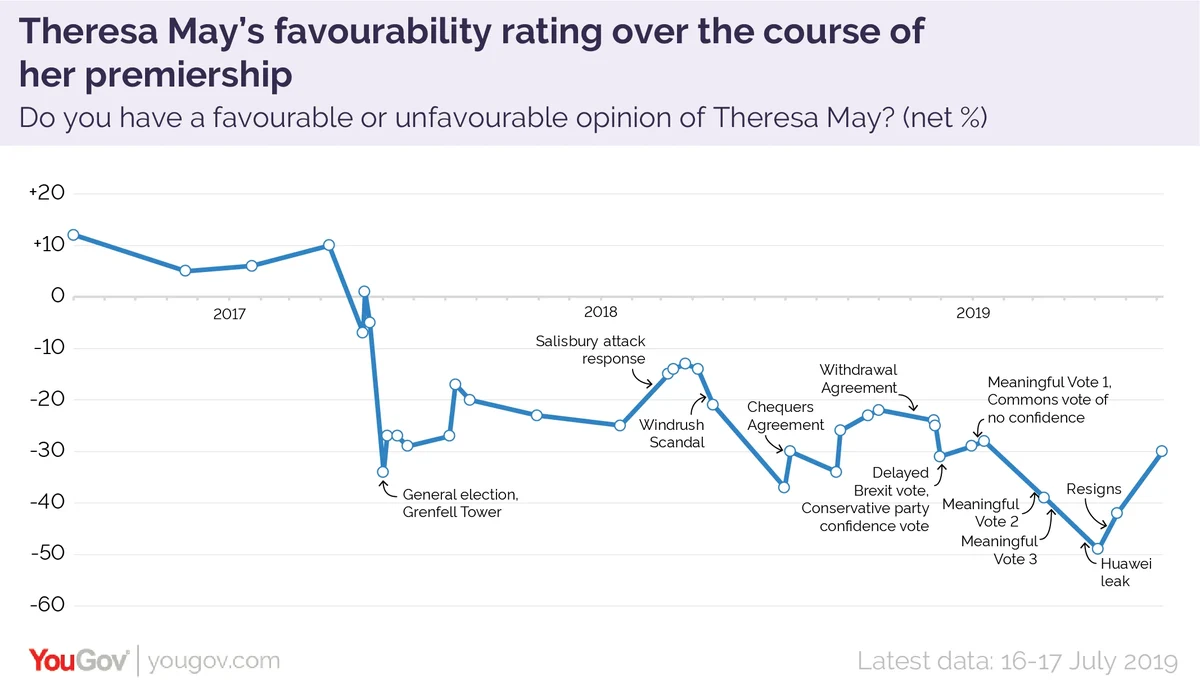YouGov takes a look at public opinion regarding Theresa May over the course of her prime ministerial career
Whether Boris Johnson or Jeremy Hunt will be moving in, Theresa May will certainly be moving out of Number 10 this week. As her premiership draws to an end we’ve asked Britons how she fared.
Our research shows that half of the public (49%) believe May has been a bad PM, compared to just one in five (21%) who think she’s performed well in the role.
At the beginning of her stint in power May’s favourability figures were positive (+12) which meant more people felt favourably of her than unfavourably. This has since slumped into negative territory (-30) with 29% having a favourable view of May and 59% having an unfavourable view.
So where did it all go wrong?

The 2017 General Election
Despite saying “I’m not going to be calling a snap general election”, May announced in April 2017 that she was, in fact, calling a snap general election to strengthen her position in Brexit negotiations.
Just after the announcement more than half (54%) of Britons said they would prefer May as Prime Minister. However, this slipped to 43% a week before the vote.
Her “strong and stable” campaign failed to land with the electorate who increasingly thought she was quite the opposite - 8% felt she was weak in July 2016, rising to 31% in June 2017.
At the time of the vote 52% of respondents thought she was out of touch, 46% saw her as dislikeable and 40% felt she was dishonest.
The outcome of the election was that May lost her majority and only clung to power by forging a deal between the Tories and the DUP. Her favourability figures subsequently fell even further to -34.
Grenfell Tower fire
The catastrophic fire at Grenfell Tower claimed 72 lives and occurred just a week after the public went to the polls.
At the time only a quarter of respondents felt the Government had done enough to help those affected by the tragedy. More recently, YouGov found that 64% of respondents don’t think the Government over the past two years has responded well.
During a visit to the scene of the fire shortly after the incident, May was booed by locals and heckled with chants of “resign”.
Windrush
In 2018 a scandal erupted after dozens of Windrush immigrants were detained, erroneously threatened with deportation and, in some cases, actually deported, despite having lived in the UK for decades.
Earlier polling found that more than three quarters of Britons (78%) thought the Windrush Generation should have the right to stay in the UK.
At the time of the scandal 64% of the public thought the Government had handled the situation badly, but only 22% of the public thought Theresa May herself was mainly responsible. Nonetheless, May’s net favourability took a decline at the time to -21.
Chequers summit
The next drop in May’s polling numbers (to -37, which was at the time her lowest ever) came after the Chequers Agreement was announced in July 2018. This was swiftly followed by the resignation of Brexit Secretary David Davis, and Boris Johnson as Foreign Secretary.
YouGov found that a majority of respondents (53%) opposed the approach that May was taking towards Brexit, and that two thirds (66%) of Leave voters thought she was aiming for a Brexit that was too soft.
By September 2018, a plurality of the public (44%) felt May was now more incompetent than competent, and over half of Britons thought she was indecisive (57%) and weak (56%).
The withdrawal agreement was announced soon after, in November 2018, causing the resignation of Brexit Secretary Dominic Raab. Our first poll for The Times, released the day after, showed half of the public opposing it (51%).
No confidence vote
Although public support for May’s deal slowly grew at first (by the end of November 27% supported the deal, whilst 46% opposed), support amongst MPs did not, causing May to delay the first “meaningful vote”.
This caused at least 48 Conservative MPs (including Jacob Rees-Mogg and the former Brexit Minister Steve Baker) to submit letters of no confidence, triggering a party vote of no confidence motion. Just before the vote May’s favourability results fell from -25 to -31. However, she managed to win by 200 to 117 votes.
YouGov had found at this time that even if May was replaced with a different leader, the majority of the public (59%) felt that they would not be able to get a better deal.
Meaningful Votes
The first meaningful vote on May’s deal was held on January 15th this year, where the Government was defeated by a majority of 230, causing Corbyn to trigger a vote of no confidence, which May won.
By the end of January, over three quarters of the public (78%) felt that the Government was doing badly at negotiating Britain’s exit from the EU.
There was, however, a slight increase in support for May’s approach towards Brexit, from 28% at the beginning of January to 33% at the end of January. But nearly half (47%) still opposed her approach including 58% of people who had voted Remain and 41% of those who had voted Leave.
Just before the third meaningful vote at the end of March, May’s favourability figures had plunged to another all-time low of -39, with 65% of the public saying they had an unfavourable view of May.
Some 45% of the public now saw the PM as untrustworthy, including 49% of those who voted Remain and 33% of those who voted Leave.
Resignation
May’s favourability score hit a low of -49 (at which time 70% had an unfavourable view of her) after the Huawei document leak, and around the time of the breakdown in talks between the Government and the Labour Party over a compromise for Brexit.
On the 24th May, May resigned, with effect of the 7th June.
What will be May’s Legacy?
A successful Brexit was always meant to be May’s legacy, but she was unsuccessful, and 73% of Britons now believe she handled the issue badly.
May’s latest favourability figures are now back up, but still negative, at -30. Almost a third (29%) have a favourable view of her, compared to just 23% at the beginning of June.
But May is still viewed as more incompetent than competent (45% to 40%) and is leaving with 58% of the public seeing her as a weak Prime Minister, contrary to her “strong and stable” 2017 campaign.
There has also been an increase in sympathy towards Theresa May. Almost two thirds (65%) now have sympathy for a PM who was faced with what many see as an impossible task. This includes 66% of those who voted Remain and 68% of those who voted Leave.
YouGov asked Britons which former PM May is most similar to. Back in 2017 we found that Thatcher was the PM the public associated most with May, and our own Chris Curtis predicted that if she were to fail on Brexit she could risk being seen as another Gordon Brown.
We have now found that similarity between Thatcher and May has fallen by half (44% to 22%) and similarity to Brown has increased by nearly half (12% to 22%).
Photo: Getty





